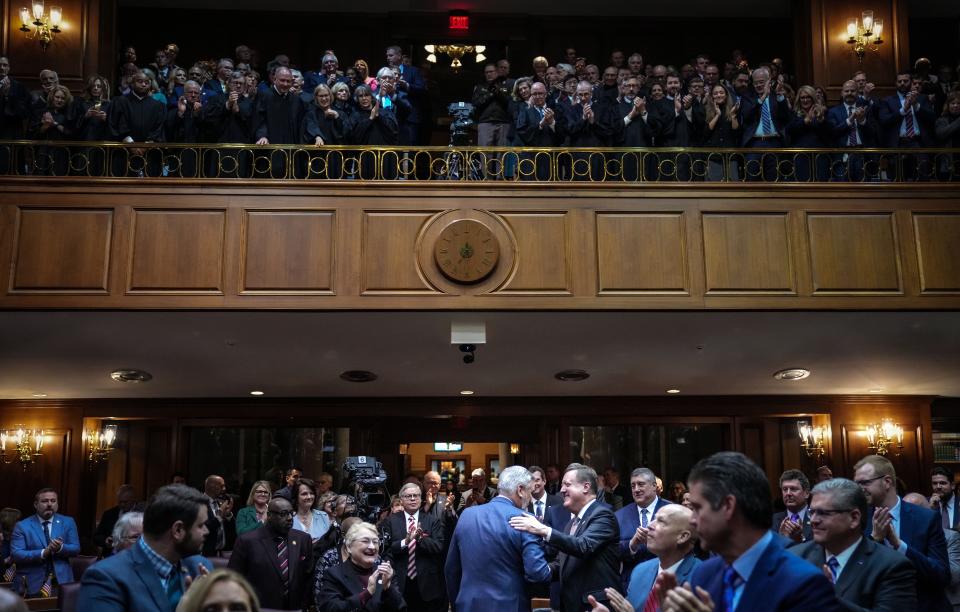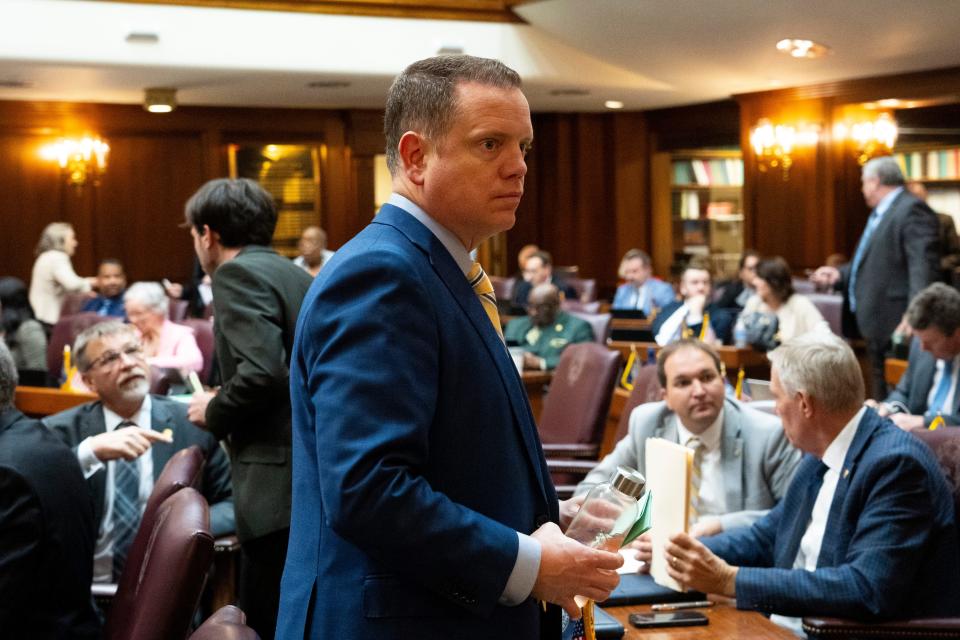Indiana Apartment Association to Speaker Huston: Who won and lost during 2024 session
We know lawmaking is imperfect and that the quality of the end result is in the eye of the beholder.
But in a system that balances on the backs of interest groups and constituents vying for influence, there are some easily identifiable winners and losers at the end of these nine weeks.
What was promised to be a quick and uncontroversial session had no shortage of emotional peaks and climactic ends. And now, a small percentage of introduced legislation waits for Gov. Eric Holcomb’s signature.
Here are some of the winners, losers and toss ups of the 2024 session.
Winners:
Gun industry
Gary’s lawsuit against major firearms manufacturers is the last hold-out from the 1990s, when dozens of cities filed similar lawsuits in an effort to hold the gun industry liable for crimes committed with their products.
Together with the Republican-dominated Statehouse, the industry won – for now.
More: Is the effort to kill a lawsuit against gunmakers a ‘Pandora’s box’? Holcomb holds the key
House Bill 1235 prohibits cities from suing gun manufacturers, retroactive to days before Gary filed its lawsuit. If Holcomb signs the bill and voids Gary’s lawsuit, the gun industry is likely safe from turning over internal documents advocates say could contain damning evidence. If the industry attempts to throw out the lawsuit based on the new law, it would likely be challenged by the plaintiffs.
Other gun legislation also succeeded this year, including House Bill 1084 that prohibits credit card companies from assigning transactions in different categories than other retailers or outdoor businesses. Additionally, language that allows the attorney general, secretary of state, comptroller and treasurer to carry guns at the Statehouse was resurrected and added to this bill.
Indiana Apartment Association
The Indiana Apartment Association was the largest lobbying force supporting the repeal of Indianapolis’ special taxing district, the economic enhancement district, which planned to raise $5.5 million a year to pay for homeless outreach, cleanliness and security downtown.
The proposal to eliminate the district didn't cross the finish line, but the end result sure sounds like a win for the apartment association: apartment owners would be exempt from the tax.

State employee retirees
On the last day of session, Hoosier public retirees had a reason to celebrate: They'll get more money. Lawmakers revived language providing retirees with a 13th paycheck this year – something that did not come to fruition last year.
The compromise language marries the House’s ad-hoc approach to providing 13th checks through one-time legislation, with the Senate’s preference for a longer-term solution for these cost-of-living adjustments.
House Republicans and Democrats on Friday celebrated the win as well as the Retired Indiana Public Employees Association, which said the extra money this year will give retirees “vital financial support.”
Gov. Eric Holcomb
Holcomb's legislative goals at the start of the year lined up well with priorities of Statehouse Republicans. Once the gavels came down on Friday, Holcomb had reasons to be pleased with the last session of his career as governor.
Lawmakers addressed the demand for child care, established procedures to elevate third grade reading scores and required computer science courses for Hoosier students to graduate from high school starting in 2029.
"The legislative successes provide a game plan to ensure that progress continues for affordable and accessible child care, improved literacy rates and increased access to post-secondary degree programs to better prepare Hoosiers for jobs of the future," Holcomb said in a statement Friday.

Hoosiers who like to drink
Alcohol lobbyists often chafe at how complex, outdated or sometimes silly Indiana’s liquor laws are.
It’s usually a shock for new Hoosiers to learn that “happy hour” has been illegal here for many years. Raise your glasses, because that will change this year if Holcomb signs House Bill 1086.
Plus, restaurants would be able to sell their specialty cocktails to-go – a boon to post-COVID business.
State Rep. Chris Jeter
Rep. Chris Jeter has two feathers in his cap as he returns to the campaign trail seeking reelection in Hamilton County. Both bills authored by the Fishers Republican this session were sent to Gov. Holcomb.
Jeter not only carried the bill that would void Gary’s gun lawsuit, but he also more notably helped negotiate the antisemitism discrimination bill to a place that seemed to satisfy all stakeholders interested in House Bill 1002, which passed with bipartisan support on the last day.
Lawmakers often jest that they've succeeded if those on both sides of a controversial issue are unhappy. So his success with what was once such a divisive bill is a win for Jeter, who carried a similar bill in 2023, which died in the Senate.

Speaker Todd Huston
House Republicans, led by House Speaker Todd Huston, managed to pass every one of their top priorities this session: Bills to tweak last year’s major workforce-training bill, define antisemitism, provide a 13th check and support the Senate’s efforts to address third-grade reading.
And even in the case of a bill that was less of a priority but nonetheless took up immense emotional bandwidth at the Statehouse — Senate Bill 52, this year’s IndyGo bill — Huston still came out the hero.
His 11th hour negotiations brought a climactic end to a wrought debate over dedicated bus lanes, and in the various statements from city leaders praising the outcome, Huston got the lion’s share of the credit.
Toss ups:
City of Indianapolis
Indianapolis had two major fights this session that some advocacy groups considered existential to the city’s future. Supporters of both IndyGo’s Blue Line and the downtown tax district came out in droves, overwhelmingly tipping the scales of public opinion toward their side. And in the end, the city survived both those fights, mostly playing defense and collecting some bruises.
Indianapolis can have its economic enhancement district, but it has to start over with rallying support for a new ordinance — and from a very different tax base. The district’s boundaries can be larger, but it exempts pretty much any building where people live, thus relying almost exclusively on the business community.
The Blue Line can proceed as planned, thanks to a compromise worked out behind closed doors between the city and legislative leaders. They dropped Senate Bill 52, the bill banning dedicated bus lanes in Indianapolis, but in exchange, IndyGo will have to adjust its Blue Line plans and have fewer dedicated lanes than planned.
On the other hand, though, Indy lost its ban on dog sales in retail pet stores after Holcomb signed House Bill 1412 into law.
Children
We’re not going to say children are losers. But asked who lost out this session, Democratic Leader Sen. Greg Taylor said it: “They’re the losers.”
He’s referring to the bills that loosened up regulations on child labor, from House Bill 1093 to Senate Bill 146.
“I’m scared to say this, but I think a lot of our children are in danger,” he said.
Meanwhile, a separate Senate bill that sought to hold vehicle owners accountable for going around school buses with stop arms extended — another child safety issue — failed to make it across the finish line this year.
More: These 2024 session bills would ease Indiana's child labor laws
Democrats are also largely disapproving of the marquee third-grade literacy legislation, Senate Bill 1, because it could lead to schools holding back more students. Republicans, meanwhile, celebrate it, because the bill also incorporates more testing and supports leading up to third grade.
“That 20% number that’s not getting there by third grade is not acceptable to us, and we want to move the needle there," Senate President Pro Tem Rodric Bray said, referring to last year’s one in five third graders not passing the IREAD, "and I'm hopeful that that is going to make a big difference."
Families with medically complex needs
Legislative leaders were hesitant to step on the executive branch’s shoes with respect to Family and Social Services Administration’s billion-dollar accounting error and the resultant decision to transition families off an attendant care program.
Toward the end of session, a bipartisan cohort passed a slew of amendments onto a fiscal bill that would require a lot of data from FSSA about this transition, but also carve out some opportunities for impacted families to get more compensation than they can now.
More: Indiana lawmakers are done asking. Instead, they're legislating the FSSA attendant care problem.
What made it across the finish line in House Bill 1120 was a softened version of these proposals; measures focused mostly on data and reporting, and don’t deliver financial relief to the families. The families haven’t lost, but they haven’t gained much, either.
Even Lt. Gov. Suzanne Crouch expressed ambivalence, saying the end result “will help a little bit, but I am disappointed we fell short of what needs to be done.”
Losers:
Transparency
Despite hours and hours of public testimony during committees throughout the first two months of the year, many bills were finalized during the last week behind closed doors.
State lawmakers can use a process called conference committees if a bill passes both chambers but the original author is unsatisfied with the final product. The conference committee has to hold one public meeting, but they sometimes last less than a minute and there is often little discussion about what is going on behind the scenes.
More: Last day of 2024 session: Bills get resurrected and gaming language rouses concern
When lawmakers wrapped up Friday, conference committees resurrected language from dead bills, including some that did not passed one chamber but not the other. Just a few examples of those proposals include: a research fund for psychedelic mushrooms, some language about tort claims against commercial vehicle operators, and heavily criticized language requiring the Indiana Gaming Commission to go to the legislator-led state budget committee if the commission needs more money.
Indiana’s public access counselor
Luke Britt is Indiana’s longest-serving public access counselor, but lawmakers sent a proposal to Holcomb that essentially strips one of the main parts of his job.
An amendment tacked onto a House bill about disruptive conduct at local government meetings would require the public access counselor to only consider plain text of the state’s public access laws or applicable court cases.
Republican lawmakers said they disagreed with many of Britt’s opinions, citing a case last year in Hamilton County as an example. Democrats decried the bill as a “step backward” for public access.
Britt has declined to speak publicly on pending legislation, but advocates for government accountability say it creates a chilling effect for a role designed to help regular Hoosiers understand whether their governments are following state laws.
Indiana wetlands
The very first bill Holcomb signed from the 2024 session stripped protections for Indiana wetlands. The proposal zipped through both chambers before the halfway point despite criticism that it was shoved through to prevent public outcry. The Hoosier Environmental Council and even state water regulators decried the bill saying it is not good for wetlands or water quality.
House Enrolled Act 1383 followed the 2021 Senate Enrolled Act 389. More than 250 acres of wetlands were completely lost in the two years following that bill due to the state no longer requiring mitigation.
Hoosiers who want legal weed
Hoosiers hoping for more progress on marijuana legalization saw momentum burn out in the Statehouse this year.
![In this file photo, a worker trims leaves from a marijuana plant at Grow Ohio’s East Fultonham facility. [Chris Crook/Times Recorder]](https://s.yimg.com/ny/api/res/1.2/xpD2mtolz1jEJiGghCo6Gw--/YXBwaWQ9aGlnaGxhbmRlcjt3PTk2MDtoPTY3NA--/https://media.zenfs.com/en/indystar-the-indianapolis-star/63f5936b060a2a266db55ebd9900111d)
There were signs of potential leading up to January. A bill on cannabis decriminalization actually got a hearing in 2023 and Ohio voters in November chose to legalize recreational marijuana.
But Republican leadership doused out any hope, as annual bills on regulation, decriminalization and medical marijuana died without hearings.
Contact IndyStar state government and politics reporter Kayla Dwyer at [email protected] or follow her on Twitter @kayla_dwyer17.
Contact IndyStar's state government and politics reporter Brittany Carloni at [email protected] or 317-779-4468. Follow her on Twitter/X @CarloniBrittany.
This article originally appeared on Indianapolis Star: Winners, Losers and Toss ups of the 2024 Indiana legislative session
Solve the daily Crossword

